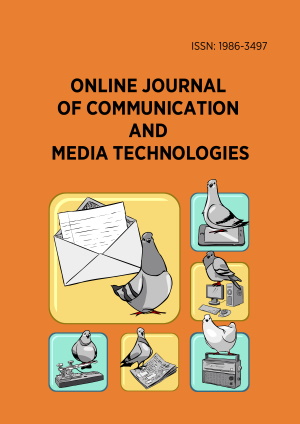Research Article
Exploring the use of ChatGPT among media students in Egypt: Opportunities and challenges
More Detail
1 Higher Colleges of Technology, Abu Dhabi, UAE* Corresponding Author
Online Journal of Communication and Media Technologies, 14(2), April 2024, e202424, https://doi.org/10.30935/ojcmt/14416
Published Online: 26 March 2024, Published: 01 April 2024
OPEN ACCESS 5846 Views 5028 Downloads
ABSTRACT
The research study examines the usage of ChatGPT, an artificial intelligence (AI)-based language model, among media students in Egypt, focusing on the opportunities and challenges it presents. Through a survey, undergraduate media students shared their familiarity with ChatGPT, frequency of usage, and the media tasks performed using the tool. The study investigates the perceptions and experiences of undergraduate media students in Egypt about the benefits, challenges and implications of using ChatGPT for various aspects of media projects in their academic curriculum. It also examines the experiences of media students about content quality, creativity, organization of content, efficiency of expression, ethical concerns, and potential effects on authenticity and originality in media projects. The study adopted a mixed methods approach with a survey questionnaire and semi-structured interviews. The participants were media students belonging to three institutions in Egypt. Findings revealed ChatGPT’s utility as a valuable tool in various media tasks while highlighting its limitations and ethical considerations. The research offers media educators and professionals insights into using ChatGPT for media projects. It also raises specific issues that can benefit AI tool developers to meet academic rigor and transparency requirements.
CITATION (APA)
Assad, A. (2024). Exploring the use of ChatGPT among media students in Egypt: Opportunities and challenges. Online Journal of Communication and Media Technologies, 14(2), e202424. https://doi.org/10.30935/ojcmt/14416
REFERENCES
- Acar, O. A. (2023). Harvard business publishing education. Hbsp.harvard.edu. https://hbsp.harvard.edu/inspiring-minds/are-your-students-ready-for-ai
- Adami, M. (2023). Is ChatGPT a threat or an opportunity for journalism? Five AI experts weigh in. Reuters Institute for the Study of Journalism. https://reutersinstitute.politics.ox.ac.uk/news/chatgpt-threat-or-opportunity-journalism-five-ai-experts-weigh
- Al Ahmed, Y. A., & Sharo, A. (2023). On the education effect of ChatGPT: Is AI ChatGPT to dominate education career profession? In Proceedings of the 2023 International Conference on Intelligent Computing, Communication, Networking and Services (pp. 79-84). https://doi.org/10.1109/ICCNS58795.2023.10192993
- Alneyadi, S., & Wardat, Y. (2023). ChatGPT: Revolutionizing student achievement in the electronic magnetism unit for eleventh-grade students in Emirates schools. Contemporary Educational Technology, 15(4), ep448. https://doi.org/10.30935/cedtech/13417
- Alneyadi, S., Wardat, Y., Alshannag, Q., & Abu-Al-Aish, A. (2023). The effect of using smart e-learning app on the academic achievement of eighth-grade students. EURASIA Journal of Mathematics, Science and Technology Education, 19(4), em2248. https://doi.org/10.29333/ejmste/13067
- Chen, L., Chen, P., & Lin, Z. (2020). Artificial intelligence in education: A review. IEEE Access, 8, 75264-75278. https://doi.org/10.1109/ACCESS.2020.2988510
- Chowdhury, M. N.-U.-R., & Haque, A. (2023). ChatGPT: Its applications and limitations. In Proceedings of the 3rd International Conference on Intelligent Technologies (pp. 1-7). https://doi.org/10.1109/CONIT59222.2023.10205621
- Connected World. (2023). ChatGPT: The most disruptive tech of the century? Connected World. https://connectedworld.com/chatgpt-the-most-disruptive-tech-of-the-century/
- Elsayed, S. (2023). Towards mitigating ChatGPT’s negative impact on education: Optimizing question design through Bloom’s taxonomy. In Proceedings of the 2023 IEEE Region 10 Symposium (pp. 1-6). https://doi.org/10.1109/TENSYMP55890.2023.10223662
- Hu, K. (2023). ChatGPT sets record for fastest-growing user base–Analyst note. Reuters. https://www.reuters.com/technology/chatgpt-sets-record-fastest-growing-user-base-analyst-note-2023-02-01/
- Ibrahim, H., Asim, R., Zaffar, F., Rahwan, T., & Zaki, Y. (2023). Rethinking homework in the age of artificial intelligence. IEEE Intelligent Systems, 38(2), 24-27. https://doi.org/10.1109/MIS.2023.3255599
- Kahraman, H. T., Sagiroglu, S., & Colak, I. (2010). Development of adaptive and intelligent web-based educational systems. In Proceedings of the 4th International Conference on Application of Information and Communication Technologies (pp. 1-5). https://doi.org/10.1109/icaict.2010.5612054
- LSE. (2023). JournalismAI. London School of Economics and Political Science. https://www.lse.ac.uk/media-and-communications/polis/JournalismAI
- Marcel, R. V. P., Fernando, B. E. M., & Roberto, Y. V. J. (2023). A brief history of the artificial intelligence:chatGPT: The evolution of GPT. In Proceedings of the 18th Iberian Conference on Information Systems and Technologies (pp. 1-5). https://doi.org/10.23919/CISTI58278.2023.10211873
- Mariappan, J., & Krishnan, C. (2022). Integration of AI in learning: A paradigm shift in education. IGI Global. https://doi.org/10.4018/978-1-6684-4083-4.ch014
- Naidu, K. (2023). ChatGPT: An ever-increasing encroachment of artificial intelligence in online assessment in distance education. Online Journal of Communication and Media Technologies, 13(3), e202336. https://doi.org/10.30935/ojcmt/13291
- NEW | JournalismAI’s Generating Change Report 2023. (2023). JournalismAI. https://www.journalismai.info/research/2023-generating-change
- OpenAI. (2022). Introducing ChatGPT. OpenAI. https://openai.com/blog/chatgpt
- Owens, B. (2023). How nature readers are using ChatGPT. Nature. https://doi.org/10.1038/d41586-023-00500-8
- Rus, V., D’Mello, S., Hu, X., & Graesser, A. (2013). Recent advances in conversational intelligent tutoring systems. AI Magazine, 34(3), 42-54. https://doi.org/10.1609/aimag.v34i3.2485
- Santhosh, R., Abinaya, M., Anusuya, V., & Gowthami, D. (2023). ChatGPT: Opportunities, features and future prospects. In Proceedings of the 7th International Conference on Trends in Electronics and Informatics (pp. 1614-1622). https://doi.org/10.1109/ICOEI56765.2023.10125747
- Shoufan, A. (2023). Exploring students’ perceptions of ChatGPT: Thematic analysis and follow-up survey. IEEE Access, 11, 38805-38818. https://doi.org/10.1109/ACCESS.2023.3268224
- Stanford News. (2023). How will ChatGPT change the way we think and work? Stanford News. https://news.stanford.edu/2023/02/13/will-chatgpt-change-way-think-work/
- Stanford University. (2022). Stanford faculty weigh in on ChatGPT’s shake-up in education. Stanford Graduate School of Education. https://ed.stanford.edu/news/stanford-faculty-weigh-new-ai-chatbot-s-shake-learning-and-teaching
- Toczkowska, N. (2023). OpenAI launches real-time internet browsing for ChatGPT. TS2 SPACE. https://ts2.space/en/openai-launches-real-time-internet-browsing-for-chatgpt/
- Wang, Y., Pan, Y., Yan, M., Su, Z., & Luan, T. (2023). A survey on ChatGPT: AI-generated contents, challenges, and solutions. IEEE Open Journal of the Computer Society, 4, 280-302. https://doi.org/10.1109/OJCS.2023.3300321
- Wardat, Y. Tashtoush, M. A., AlAli, R., & Jarrah, A. M. (2023). ChatGPT: A revolutionary tool for teaching and learning mathematics. EURASIA Journal of Mathematics, Science and Technology Education, 19(7), em2286. https://doi.org/10.29333/ejmste/13272
- Wu, T., He, S., Liu, J., Sun, S., Liu, K., Han, Q.-L., & Tang, Y. (2023). A brief overview of ChatGPT: The history, status quo and potential future development. IEEE/CAA Journal of Automatica Sinica, 10(5), 1122-1136. https://doi.org/10.1109/jas.2023.123618

 The articles published in this journal are licensed under the CC-BY Creative Commons Attribution International License.
The articles published in this journal are licensed under the CC-BY Creative Commons Attribution International License.